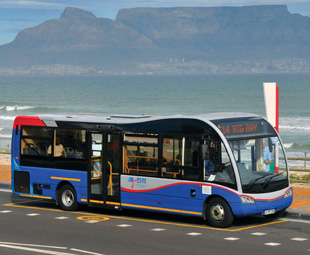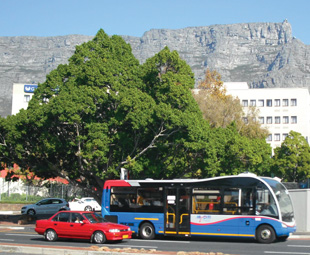A word from the converted

The Cape Town MyCiti bus rapid transit (BRT) system appears to be among the more efficient and friendly available to South Africa’s commuters. FOCUS speaks to a recently converted Capetonian, who is full of praise for the system.
Mick Kerford has been using the MyCiti service, at least five times a week, for the past year. As a freelance transport writer, Kerford may be familiar to a few members of the local transport industry. Over the years, he has also worked for London Transport, City Tramways and Western Greyhound – so one might struggle to find a better-versed person to critique public transport.
“There was a time when car drivers looked down on public transport users. In Cape Town the tide is turning,” Kerford muses. “While car-borne commuters from Table View sit fuming in traffic for two to three hours during the morning peak, passengers on MyCiTi buses speed past on reserved roads, completing the journey in 30 minutes.
“Not only that, but at a scant R7,40 per peak trip, the bus rapid transit (BRT) passenger spends a fraction of the cost per kilometre incurred by car users,” he continues.
But it did take some convincing for this “old hand in bus operation” to give MyCiti its shot. “I was sceptical about three things. I couldn’t see how a new BRT service could be overlaid on an existing road network, especially in such difficult terrain. Yet, with relatively little disruption to traffic, MyCiTi constructed stations and reserved lanes on busy highways,” he begins.
“I couldn’t envisage a bus coping with the twists, turns and gradients of the tightly packed residential suburbs on the slopes of the mountain. The manoeuvrable Optare Solo has, however, made these and other routes its own … Plus the distinctive profile quickly made the bus an icon of the service.
“Finally, I had my doubts about automatic fare collection, yet this has proved to be a success. The myconnect card frees the driver from taking fares and accounting for the day’s takings, allowing him to concentrate on driving. It is more secure and it provides detailed statistics on journeys made. Small wonder that myconnect won an international MasterCard Transport Ticketing Award in the ‘Best Bank-Card Ticketing Scheme’ in London in January,” notes Kerford.
He points out, however, that the cards could be more freely available, especially for the likes of Cape Town’s many tourists who are “thwarted or perplexed by a system that doesn’t accept cash”.
 Nonetheless, Kerford is now full of praise for the system. “The route planners have very thoughtfully embraced malls, schools, hotels and hospitals in the network, thus optimising utility,” notes the Blaauwberg resident, who uses the system to the Civic Centre; Upper Long Street; Sea Point, Hout Bay and Camps Bay (the latter by the picturesque route “over the top”, he says); and to his favourite restaurant in Melkbosstrand.
Nonetheless, Kerford is now full of praise for the system. “The route planners have very thoughtfully embraced malls, schools, hotels and hospitals in the network, thus optimising utility,” notes the Blaauwberg resident, who uses the system to the Civic Centre; Upper Long Street; Sea Point, Hout Bay and Camps Bay (the latter by the picturesque route “over the top”, he says); and to his favourite restaurant in Melkbosstrand.
He’s also impressed by the drivers, who he says are alert, well-trained, friendly and helpful. “I have seen them go out of their way to assist passengers who need help,” Kerford tells us.
“The team spirit comes from the top. Cape Town councillor Brett Herron, mayoral committee member for transport, roads and storm water, is a frequent, pro-active communicator, who responds candidly to any issues.
“Like all successful systems, MyCiTi is the product of the right people, procedures and equipment,” he continues. “The station staff are disciplined, courteous and knowledgeable. The stations themselves are spotless, secure and decorated with art reflecting the local environment. The services are frequent and punctual.”
Does Kerford feel the system will be able to “convert” more private motorists to public transport commuters? With continued “ratcheting” of petrol and parking prices, stifling traffic congestion and drink-driving crackdowns on leisure-seekers, he reckons car users need to consider safer, attractive, convenient alternatives …
“Transport systems develop their own critical mass through word-of-mouth,” says the industry veteran. “Every new MyCiti route offers access to additional groups and makes the network more comprehensive and attractive (a route to Du Noon township was recently included and one to Mitchells Plain will begin operation mid-year). The withdrawal of competing taxi services, as a result of agreements with taxi associations, will also see more commuters on the buses,” he notes.
“As a barometer of acceptability, property advertisements are increasingly featuring a MyCiTi route as a draw-card,” Kerford candidly quips.
A tourist’s perspective
“My fiancé and I went down to Cape Town for a friend’s wedding, at the end of December 2013, and thought we’d stay a bit longer for vacation,” says Heinrich Horn, a candidate attorney from Carletonville – a gold-mining town in western Gauteng. “But it seemed as if the ‘whole world’ had the same idea, as tourists and cars rained down on the Mother City …”
To get around, Horn hired a vehicle for the duration of their stay, but says it proved to be more of a hassle than a help. “Navigating in and around Cape Town was a stressful process, as congestion and road hogs plagued the Mother City during this past festive season.”
In the name of sanity and comfort, Horn and his partner opted to use the MyCiTi buses instead, leaving the hired car at their Green Point hotel. “We did the ‘tourist thing’ – packed our backpack each morning and set out on foot to where we needed to go, hopping onto a bus if our destination proved to be too far.”
Horn praises the carefree travelling and friendly staff. “The MyCiTi staff were always willing to help, pointing us in the right direction and telling us which bus to use if we weren’t sure. On one occasion, when we landed up on the wrong bus station platform and saw ‘our bus’ driving away, the driver actually turned around and came back to fetch us …”
He continues: “The next time we go to Cape Town, we will definitely use the system again. It’s a carefree means of transport that is affordable, easily accessible, clean and punctual.”
Published by
Focus on Transport
focusmagsa




